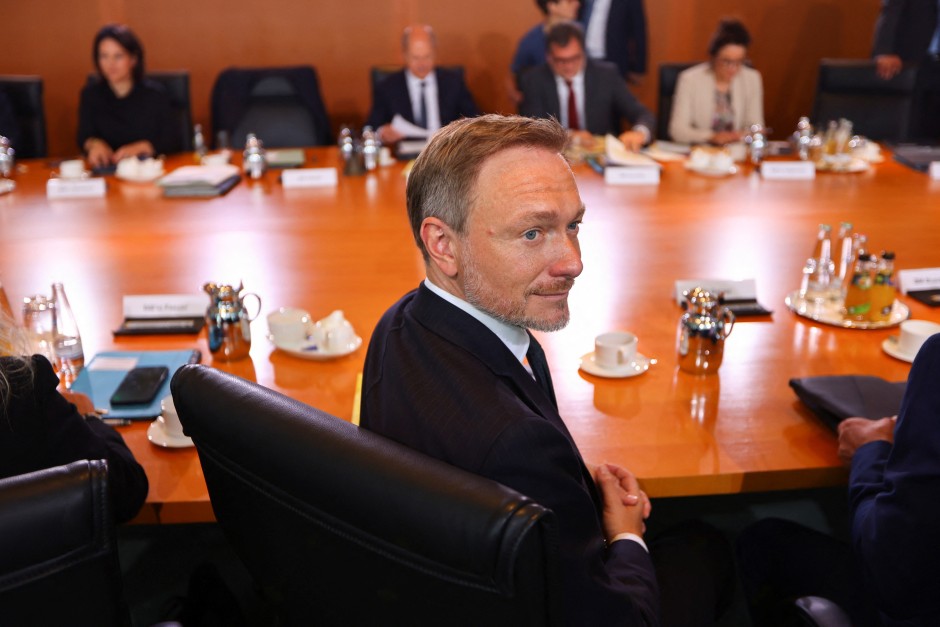
Dhe federal cabinet has approved the government draft for the federal budget for 2024. The news agencies AFP, dpa and Reuters reported on Wednesday, citing government circles. A press conference on the federal budget with Finance Minister Christian Lindner (FDP) is planned for the afternoon.
The federal government had long argued about the establishment of the budget. This was reflected in the issues of parental allowance and basic child security. According to the draft, expenditure should drop significantly to 445.7 billion euros. After the crisis-related additional spending in previous years due to the corona pandemic and the energy price crisis, an austerity course is now to be embarked on. The new debt is expected to be 16.6 billion euros in 2024. This is intended to comply with the debt brake enshrined in the Basic Law.
Federal Finance Minister Lindner, as master of the budget, sees the draft as a return to normality after several years in which the budget was inflated by hundreds of billions of euros in new debt to deal with the corona pandemic and the consequences of the Ukraine war. All departments except for the Ministry of Defense had to make savings.
return to normal
For the second year in a row, the debt brake should come into effect again in 2024. According to a cabinet proposal available to the Reuters news agency, Lindner wants to fully exploit the scope for the permissible new debt with almost 16.6 billion euros. Spending of 445.7 billion euros is planned for 2024, around 30 billion euros less than this year.
Despite the cabinet decision, the dispute over the details has not been resolved. In the case of the basic child security planned from 2025, for example, the traffic light coalition still has to agree by the end of August how much money it wants to earmark for this in the financial plan. Lindner calculated two billion euros, Family Minister Lisa Paus (Greens) originally planned twelve billion euros. The economic plan, which regulates the expenditure of the climate and transformation fund (KTF) in detail, is still pending. From this, for example, the subsidy for replacing the heating system is to be paid from 2024.
New disputes between the FDP and the Greens also triggered possible restrictions on parental allowance. Paus wants to slightly reduce the group of beneficiaries by lowering the income limit to 150,000 euros, up to which couples can apply for parental allowance. She justifies this by saying that she has to implement a savings target from the Ministry of Finance. FDP and Lindner, however, explained that the savings contribution could also be made differently by Paus. Despite the savings, the family minister’s budget for 2024 has earmarked almost eight billion euros for parental allowance, i.e. 290 million euros less than in 2023.
The proposed changes and other austerity measures are part of a budget finance bill that the government plans to enact by mid-August. So changes are possible. The Bundestag does not decide on the entire federal budget until the end of the budget week on December 1st. Until then, numerous changes in the draft budget can be expected, which will also take into account the new tax estimate due in autumn and an adjustment in economic expectations.
What economists think of the budget
Numerous leading economists are very critical of the federal government’s draft budget. The head of the German Institute for Economic Research (DIW), Marcel Fratzscher, spoke on Wednesday on Bavarian Radio of a “missed opportunity”. Federal Finance Minister Christian Lindner (FDP) tried the impossible of maintaining the debt brake while refusing additional tax burdens and investments in the future.
Economics Veronika Grimm criticized insufficient spending on defense, climate-friendly energies and, above all, in education. “Especially after the corona pandemic and in view of the shortage of skilled workers that is coming to Germany, not enough is happening by far,” she told the “Augsburger Allgemeine”. In addition, direct and indirect subsidies for coal, oil and gas should be phased out in favor of green energy investments.
The head of the center for public finance at Munich’s Ifo Institute, Niklas Potrafke, also named the areas of infrastructure, education and defense that were neglected in the budget. Instead, money is being spent to boost consumption – such as federal grants for pension insurance of 112 billion euros. “We should prioritize spending on public goods that all citizens benefit from,” he told the Augsburger Allgemeine.
The head of economics, Monika Schnitzer, criticized cuts in growth-enhancing investments, such as funding for digitization. “It was saved at the wrong end,” she told the “Rheinische Post”. The basic problem is the sole focus on the debt brake. “That’s why capital spending regularly falls short. A reform that would allow debt financing of net investments could fix that.”
Schnitzer considers the planned debts of 16.6 billion euros to be acceptable. The national debt last year of less than 30,000 euros per inhabitant seems manageable, she told Bayerischer Rundfunk. Other euro countries like Italy, France and Greece have much higher debt ratios.
Martin Beznoska from the German Economic Institute called for the crisis aid to be reduced. For example, short-time work benefits could be ended and the subsidies to the health system caused by the pandemic reduced, he told the “Augsburger Allgemeine”. The reduced VAT for hotels, gastronomy and the cultural sector could also be eliminated.









